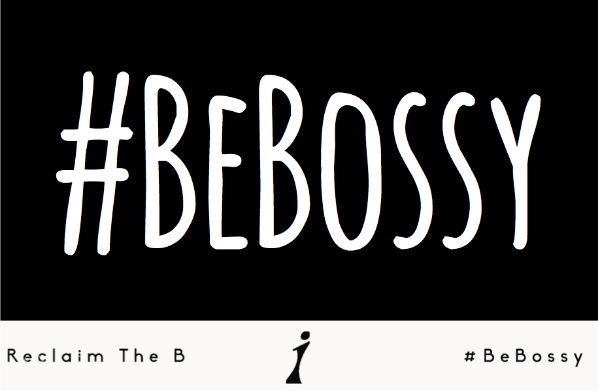Although the Rutgers University faculty and students are rising as one to try to block her from delivering the commencement address this spring, Condoleezza Rice is able to ignore such minor ignominies and concentrate instead on something that really, really matters: banning the perfectly good English word bossy.
Bossy, you see, is a sexist word. If you call a little girl bossy, you will stunt her growth. Or something.
Sporting their brand new “Ban Bossy” buttons, a high-powered trio of anti-bossy bosses—former secretary of state Rice, Facebook COO and Lean In author Sheryl Sandberg, and Girls Scouts CEO Anna Maria Chavez—talked to Parade magazine last Sunday about the pressing need to put yet another word on the politically incorrect list.
As the magazine put it, they “aim to change the conversation about girls and leadership.” We were treated to some of the personal trials that led them to undertake this worthy crusade.
“Ninth graderSheryl Sandberg wasn’t shy about raising her voice,” Parade notes. “But the message she got from a faculty adviser didn’t praise that trait. ‘She’s too aggressive, too bossy,’ the teacher said. ‘You don’t want to be bossy.’” Parade comments—rather needlessly—that “luckily” little Sheryl "didn’t listen.”
Condoleezza Rice who has been viciously attacked by the Left shares her own story, though it is hard to imagine that this is really a tramatic moment or the worst name the brave female conservative has been called.
“I remember when I was six years old,” Dr. Rice shared, “we were having an event at school where different dolls were on display. I said that the tallest doll needed to be on the end, and my little friend said to me, ‘Oh, you’re just so bossy.’” And you thought growing up in segregated Birmingham, Ala., was the challenge!
Ms. Chavez's recollection was more uplifting. “Instead of teaching me how to cook, my mother taught my brothers how to cook, and me how to run a board meeting,” she said. Can't say that hasn't paid off, can you? Ms. Chavez, by the way, has held up as role models for adolescent girls such peerless leaders as former speaker Nancy Pelosi and HHS Secretary Kathleen Sebelius. If you call Kathleen bossy, she'll cancel your health insurance policy.
Admittedly, bossy is a word most likely to be applied to women or metro-sexual men (Hillary and Barack are bossy—Vladimir Putin, not so much–he's more–uh—forceful). But so what? Sometimes bossy just happens to be the right word to describe a bossy little girl—or a bossy big girl or a man or boy. And we're supposed to refrain from calling a domineering girl-child (of any age) bossy because it might injure her delicate psyche?
Not only is the “ban bossy” campaign a hopelessly trivial way for three highly-successful women to be spending time, it comes at a time when it’s boys, not girls, who seem most in need of extra attention from our society. Girls are thriving academically compared to boys. Schools tend to be more girl-centric after forty years of feminist activism on our behalf. Fifty-seven percent of bachelor’s degrees and 52 percent of doctorates in the United States are now awarded to women. Female academic achievement is a cause for celebration, but we should not be blind to the marginalization of boys.
“Boys in all ethnic groups and social classes are far less likely than their sisters to feel connected to school, to earn good grades, or to have high academic aspirations,” Christina Hoff Sommers recently wrote in The Atlantic magazine. She cited a 2011 report from Brookings Institution that quantified the remarkable decline in the earning power of men from 1969 until the study was done.
Psychologist Helen Smith, author of “Men on Strike: Why Men Are Boycotting Marriage, Fatherhood, and the American Dream—and Why It Matters,” believes that a legitimate feminist movement “has morphed into a whole political system based on women having special privileges, and the more privileges they have the more entitled they feel.” Latest privilege grab: a girl or woman must never be called bossy!
Likely it’s still acceptable to call a man patriarchal—and that’s a relatively nice word in the feminist-approved lexicon. It is particularly disappointing that Condoleezza Rice signed onto this ridiculous campaign.
Surely, Rice, a Republican, realizes that Democrats have been using the “war on women” rhetoric as a ploy to raise cash and get votes by convincing women that Republicans are scary. The underlying theme of the “ban bossy” campaign is that women are ill-treated in American society. The campaign will be a boon to Democrats who will now be able to step forward and protect women from the scourge of being called bossy.
Maybe Rice thinks it’s productive for conservative-leaning women to become involved in these mainstream campaigns. If so, she is sadly mistaken. She should know from her treatment at the hands of the enlightened academics at Rutgers that no matter how conciliatory conservative women try to be, it just doesn’t win many friends on the left.
In the light of the Rutgers controversy (it does appear that Rice will be allowed to deliver the speech) should Dr. Rice be working to promote more intellectual diversity rather than banning a word? Just for the record, I don’t intend to let Rice, Sandberg, and Chavez tell me what to do. They may be three bossy ladies, but they can't stop me from exercising my right to free speech, and nor should they really try.


